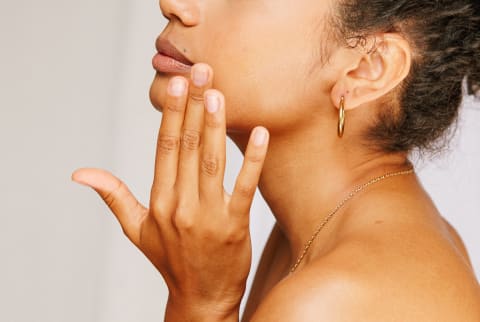There's A Reason You May Face Chapped Lips Right Now, Says A Derm (No, It's Not The Weather)


There's a bunch of culprits for flaking, chapped lips: drier weather, dehydration, even friction from your face mask. Perhaps you have a favorite lip salve on hand to fill in those cracks—but most of the time, a trusty balm is more of a quick fix than a long-term solution. Best to get to the bottom of what's causing the chap in the first place so you can target the source.
Well, according to dermatologist Angelo Landriscina, M.D., there's another reason you may be facing a painful pout. He reveals in a recent TikTok video: "If you have chapped lips all the time, it might be because of your skin care." Oh, do tell.
Advertisement
How your skin care can cause chapped lips.
The thinner the skin, the more gently you need to treat it. And second to the delicate under-eye area, the lips are the thinnest skin on your entire face. That said, even if your face can handle potent active ingredients (retinoids, AHAs or BHAs, and the like), the skin around your lips may need a bit of a buffer.
OK, so you're not actually applying these ingredients to your lips during your routine (unless you're opting for, say, a lip peel), but according to Landriscina, "It's actually pretty easy for most products to transfer onto your lips, especially cleansers."
If you use an acid-containing wash in your skin care routine, it's quite easy for those ingredients to splash onto your lips as you massage them in. Patting in serums or overnight treatments makes it a little easier to avoid the area, but those ingredients can still make their way to your lips—and thus, an irritated pout.
What to do about it.
"So how do you prevent the chap?" Landriscina proposes. You can, of course, just do your best to avoid your lip area when cleansing and applying those active ingredients. But unless you're super meticulous about it, said ingredients can still get a little too close to the Cupid's bow. If you really want to go the extra mile, he suggests applying a lip balm or thick ointment to your lips before starting your entire routine.
The oily substance acts as a barrier between your skin and those potentially irritating actives (similar to how derms recommend diluting retinoids with an eye cream or moisturizer before smearing on under the eyes). That way, even if those ingredients unintentionally make their way to your lips, they won't act as potent. Plus, you're simultaneously hydrating your lips with conditioning, plumping ingredients—which can help any leftover flakes (from, say, a dip in temperature) subside.
Advertisement
The takeaway.
Sure, cracked lips might be a product of dry weather or just dehydration in general, but if you're swiping on ointments to no avail, know that it's not you—it might just be your skin care. Especially if you're one to use potent retinoids or chemical exfoliants (even niacinamide can be irritating on super-sensitive skin, says Landriscina), those ingredients can transfer onto your lips and cause some unforgiving chap.
Advertisement

Jamie Schneider is the Beauty & Wellness Editor at mindbodygreen. She has a B.A. in Organizational Studies and English from the University of Michigan, and her work has appeared in Coveteur, The Chill Times, and Wyld Skincare. In her role at mbg, she reports on everything from the top beauty industry trends, to the gut-skin connection and the microbiome, to the latest expert makeup hacks. She currently lives in New York City.